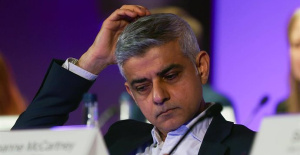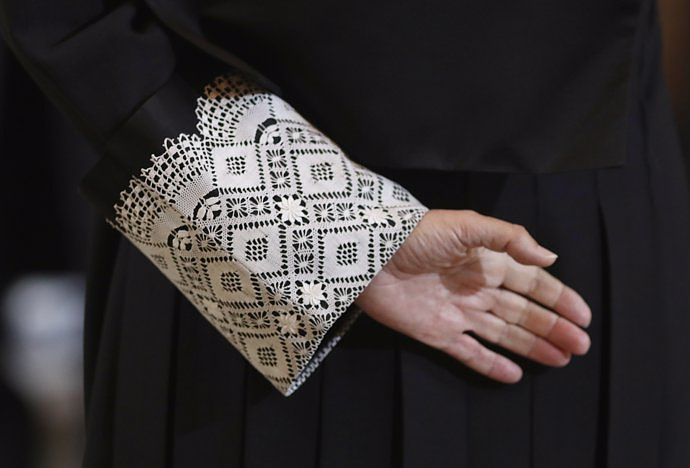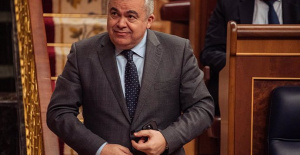Each association has had five minutes to present their impressions
BRUSSELS/MADRID, Feb. 8 (EUROPA PRESS) -
Associations of Spanish judges and prosecutors have seen "a lot of interest" from the European Parliament (EP) group that examines the rule of law in Spain in the amnesty law proposal that is still in Congress and in the interim situation that the General Council of the Judiciary (CGPJ) is experiencing, which has now been in office for five years, according to the legal sources consulted by Europa Press.
The meeting was attended by the Professional Association of the Magistracy (APM), Judges and Judges for Democracy (JJpD), the Judicial Association Francisco de Vitoria (AJFV), the Independent Judicial Forum (FJI), the Association of Prosecutors (AF) and the Progressive Union of Prosecutors (UPF).
A representative of the European Commission has also been present, but no member of the Spanish Executive has attended, since the Minister of the Presidency, Justice and Relations with the Cortes, Félix Bolaños, -- who had been invited -- alleged that he was not He could attend because it coincided with the meeting he had planned with the Venice Commission, which is in Madrid this Thursday to meet with representatives of the Government, the Chambers, the CGPJ and the judicial associations.
According to sources present at the meeting, the meeting served for the associations to convey to the European Parliament group their impression of the rule of law in Spain. According to these sources, the majority of the associations have agreed to denounce the blockage to the renewal of the CGPJ and their concern about the attacks on the judges by leaders of various political currents.
Although at first the group has limited itself to listening and collecting the impressions of the Spanish judges and prosecutors without issuing any assessment or sharing for the moment its conclusions about the rule of law in Spain, it has later asked with "great interest" about aspects such as the amnesty law and the CGPJ, the sources consulted have pointed out.
In the case of the Council, the associations have insisted that its non-renewal seriously affects the functioning of Justice, since the body, being in office, cannot make appointments to the judicial leadership, which already accumulates more than 80 vacancies. It should be remembered that the judicial associations have spoken out in joint statements on repeated occasions to denounce this situation.
Regarding the bill that seeks to amnesty more than a decade of the Catalan independence process, some associations have warned of its effects and have defended that it would involve interference in the work of judges. Others, however, have defended that in principle it does not represent a problem for the Spanish rule of law, while they have insisted that it is not even a law that is in force and that it is not yet known under what terms it will be approved.
Regarding this point, the group has asked the associations why some judges have spoken publicly about the amnesty when there has not yet been an approved law. Some of these have assured that they do not share these actions, while others have defended that as judges they have the responsibility to pronounce themselves as guarantors of the Rule of Law.
Likewise, MEPs have asked about the model for electing members to the CGPJ, given that this is one of the obstacles why the renewal of the governing body of judges has not yet been achieved.
There has not been unanimity on this matter. The Professional Association of the Judiciary (APM), which has more than 1,400 members; AJFV, with more than 930; and FJI, with more than 340, agree on the need to change the model to end political intervention through Parliament but differ on how. For its part, Judges for Democracy (JJpD), which has more than 500 members, insists that the priority is to appoint a new CGPJ with the current system.
Within the framework of the meeting, the group also wanted to know the opinion of the associations on the congressional investigative commissions on the alleged 'lawfare'. On the sidelines, some of the associations have defended that the rule of law in Spain "is in danger" also due to the lack of resources and the excessive workload in the courts.
The meeting, which lasted just over two hours, allowed the group to appreciate the issues on which the judicial and prosecutorial associations agree and the issues on which they differ. The European Commission has intervened to recall its recommendations on the rule of law in Spain contained in the report it made public last year.
Bolaños, who was not present, excused his absence because he had to receive in Madrid the mission of the Venice Commission that analyzes the amnesty law at the request of the Senate, but the Popular Party has criticized that the MEPs did not receive a response to a questionnaire either. sent by this group to the Government with precise questions.
The rule of law monitoring group depends on the Committee on Civil Liberties, Justice and Home Affairs (LIBE) of the European Parliament, to which it will have to report after the results of this Thursday's dialogue and will be able to make recommendations on possible steps to be followed by the parliamentary committee.
The team is made up of fourteen MEPs, two from each political family, and there is only one Spanish representative, PP MEP Javier Zarzalejos, for whom it is "shameful" that Pedro Sánchez's Government "is hiding" from the call for an examination of the MEPs.
In any case, the meeting served, according to different sources, to hear the general opinion of the Community Executive on the rule of law in Spain as stated in its latest annual report for 2022, in which Brussels does not identify systemic risks for democratic health. in Spain.
The community report does point out serious concern about the blockage of the CGPJ and other issues such as strengthening the status of the attorney general, particularly regarding the separation of the mandates of the Attorney General and the Government. The next edition of the report is expected next July.
The amnesty law that the Government agreed with ERC and Junts to ensure Sánchez's investiture, in any case, was not addressed by the last report from Brussels, although it has raised questions among the members of the group of MEPs.
The Commissioner of Justice, Didier Reynders, who has also undertaken an unprecedented mediation between PP and PSOE to try to unblock the urgent renewal of the CGPJ, has made it clear on several occasions that, although he is following the situation "carefully", he will not give his opinion. assessment of the amnesty law and its compliance with the limits of Community law until the parliamentary processing of the law is concluded in Spain.
In its periodic review of the situation in different EU countries, this group already summoned the then head of Spanish Justice, Pilar Llop, in September 2022, who cited agenda reasons to avoid the appointment. Months later, the minister went to the parliamentary commission on which this group depends, that of Civil Liberties, Justice and the Interior, to discuss in a public session with the MEPs about issues such as the CGPJ blockade and the reform of the Penal Code.
The LIBE commission created this group last term to examine the democratic risks in Malta and Slovenia after the murder of journalists in these two countries; although in this legislature it has been expanded to the rest of the countries.

 Exploring Cardano: Inner Workings and Advantages of this Cryptocurrency
Exploring Cardano: Inner Workings and Advantages of this Cryptocurrency Seville.- Economy.- Innova.- STSA inaugurates its new painting and sealing hangar in San Pablo, for 18 million
Seville.- Economy.- Innova.- STSA inaugurates its new painting and sealing hangar in San Pablo, for 18 million Innova.- More than 300 volunteers join the Andalucía Compromiso Digital network in one month to facilitate access to ICT
Innova.- More than 300 volunteers join the Andalucía Compromiso Digital network in one month to facilitate access to ICT Innova.-AMP.- Ayesa acquires 51% of Sadiel, which will create new technological engineering products and expand markets
Innova.-AMP.- Ayesa acquires 51% of Sadiel, which will create new technological engineering products and expand markets Khan is re-elected mayor of London and underpins Labor's victory in local elections
Khan is re-elected mayor of London and underpins Labor's victory in local elections Felipe VI swears the flag again 40 years later at the AGM with Princess Leonor as a witness
Felipe VI swears the flag again 40 years later at the AGM with Princess Leonor as a witness Freixenet and unions agree to reduce working hours by 20-50% this year due to the drought
Freixenet and unions agree to reduce working hours by 20-50% this year due to the drought STATEMENT: Nearly 400 people participate in the II Family Support Conference at UIC Barcelona
STATEMENT: Nearly 400 people participate in the II Family Support Conference at UIC Barcelona How Blockchain in being used to shape the future
How Blockchain in being used to shape the future Not just BTC and ETH: Here Are Some More Interesting Coins Worth Focusing on
Not just BTC and ETH: Here Are Some More Interesting Coins Worth Focusing on A sensor system obtains the fingerprint of essential oils and detects if they have been adulterated
A sensor system obtains the fingerprint of essential oils and detects if they have been adulterated Faraday UPV presents the 'Origin' rocket to exceed 10 km of flight: "It is the beginning of the journey to space"
Faraday UPV presents the 'Origin' rocket to exceed 10 km of flight: "It is the beginning of the journey to space" The Generalitat calls for aid worth 4 million to promote innovation projects in municipalities
The Generalitat calls for aid worth 4 million to promote innovation projects in municipalities UPV students design an app that helps improve the ventilation of homes in the face of high temperatures
UPV students design an app that helps improve the ventilation of homes in the face of high temperatures A million people demonstrate in France against Macron's pension reform
A million people demonstrate in France against Macron's pension reform Russia launches several missiles against "critical infrastructure" in the city of Zaporizhia
Russia launches several missiles against "critical infrastructure" in the city of Zaporizhia A "procession" remembers the dead of the Calabria shipwreck as bodies continue to wash up on the shore
A "procession" remembers the dead of the Calabria shipwreck as bodies continue to wash up on the shore Prison sentences handed down for three prominent Hong Kong pro-democracy activists
Prison sentences handed down for three prominent Hong Kong pro-democracy activists ETH continues to leave trading platforms, Ethereum balance on exchanges lowest in 3 years
ETH continues to leave trading platforms, Ethereum balance on exchanges lowest in 3 years Investors invest $450 million in Consensys, Ethereum incubator now valued at $7 billion
Investors invest $450 million in Consensys, Ethereum incubator now valued at $7 billion Alchemy Integrates Ethereum L2 Product Starknet to Enhance Web3 Scalability at a Price 100x Lower Than L1 Fees
Alchemy Integrates Ethereum L2 Product Starknet to Enhance Web3 Scalability at a Price 100x Lower Than L1 Fees Mining Report: Bitcoin's Electricity Consumption Declines by 25% in Q1 2022
Mining Report: Bitcoin's Electricity Consumption Declines by 25% in Q1 2022 Oil-to-Bitcoin Mining Firm Crusoe Energy Systems Raised $505 Million
Oil-to-Bitcoin Mining Firm Crusoe Energy Systems Raised $505 Million Microbt reveals the latest Bitcoin mining rigs -- Machines produce up to 126 TH/s with custom 5nm chip design
Microbt reveals the latest Bitcoin mining rigs -- Machines produce up to 126 TH/s with custom 5nm chip design Bitcoin's Mining Difficulty Hits a Lifetime High, With More Than 90% of BTC Supply Issued
Bitcoin's Mining Difficulty Hits a Lifetime High, With More Than 90% of BTC Supply Issued The Biggest Movers are Near, EOS, and RUNE during Friday's Selloff
The Biggest Movers are Near, EOS, and RUNE during Friday's Selloff Global Markets Spooked by a Hawkish Fed and Covid, Stocks and Crypto Gain After Musk Buys Twitter
Global Markets Spooked by a Hawkish Fed and Covid, Stocks and Crypto Gain After Musk Buys Twitter Bitso to offset carbon emissions from the Trading Platform's ERC20, ETH, and BTC Transactions
Bitso to offset carbon emissions from the Trading Platform's ERC20, ETH, and BTC Transactions Draftkings Announces 2022 College Hoops NFT Selection for March Madness
Draftkings Announces 2022 College Hoops NFT Selection for March Madness
























